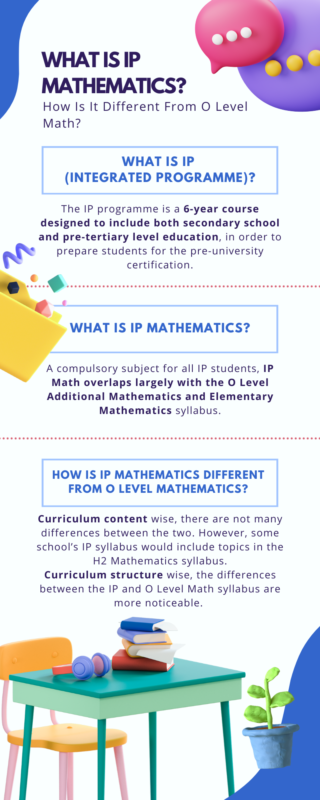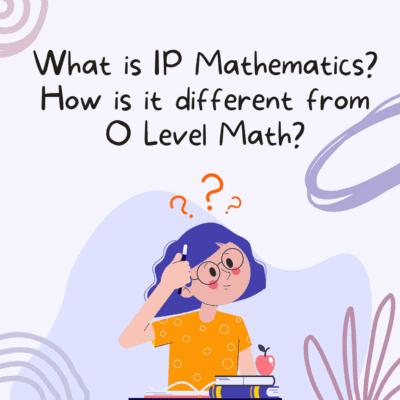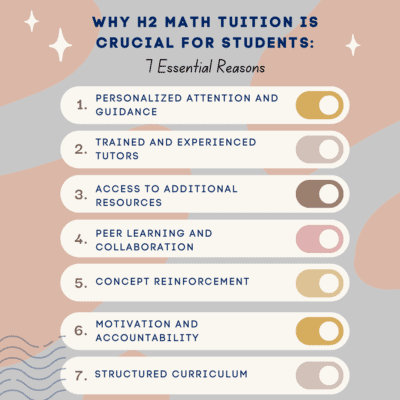What is IP (Integrated Programme)?
Choosing which secondary school to enroll in is already a very stressful decision for a student, yet alone choosing to take the Integrated Programme (IP).
The IP programme is a 6-year course designed to include both secondary school and pre-tertiary level education, in order to prepare students for the pre-university certification: the GCE A-Level, IB Diploma or NUS High School Diploma.
One of the main subjects that stresses many parents and students out when taking the IP syllabus would be IP Mathematics.
What Is IP Mathematics?
As mentioned previously, the IP Mathematics syllabus is curated to prepare students for pre-university level examinations. A compulsory subject for all IP students, IP Math overlaps largely with the O Level Additional Mathematics and Elementary Mathematics syllabus.
Since the syllabi are crafted and determined by each school, the pacing and order in which topics are taught will differ from school to school. Nonetheless, in order to prepare IP students for their pre-tertiary level examinations, some topics will be emphasised over the others — namely Trigonometry, Algebraic Manipulation and Calculus.

How Is IP Mathematics Different From O Level Mathematics?
Curriculum content wise, there are not many differences between the two. However, some school’s IP syllabus would include topics in the H2 Mathematics syllabus such as Transformation of Graphs, Functions, Integration using the U-substitution method, and Permutations and Combinations. While these topics may be covered, they are typically not done so in an in-depth manner. Furthermore, the IP syllabus usually emphasises on topics which are geared towards preparing their students for H2 Mathematics at the GCE A Level examination, and rightfully so! These topics usually are linked to Trigonometry and Calculus.
Curriculum structure wise, the differences between the IP and O Level Math syllabus are more noticeable. For the IP syllabus, students may learn Mathematics in a less fragmented manner as they draw the links between Elementary and Additional Mathematics for a more cohesive learning experience. For example, when IP schools teach their students about quadratic equations (a topic found in the E Math syllabus), they would naturally link it to surds and polynomials (topics found in the A Math syllabus). By learning Mathematics in such a cohesive manner, instead of segregating it as seen in the E Math and A Math syllabus, students are better able to build a stronger foundation in their understanding of Mathematics in time to come.
Pros And Cons Of IP Mathematics
| Pros | Cons |
| A more cohesive and coherent way to learn Mathematics Curriculum is geared and structured towards pre-tertiary level examinations (GCE A Level and IB) Learn Mathematics at a higher and more advanced level More room for independent learning and discovery of Mathematics | More difficult to find resources, such as books and past year papers), as every school follows a different syllabus Easier to fall behind if the student has a weak Mathematical foundation or a lack of motivation It is a 4-year commitment Students may struggle with Math at a pre-tertiary level if they barely meet the minimum requirements to promote |
Conclusion
Undoubtedly, IP Mathematics is more rigorous than O Level Mathematics. As it is a 4-year commitment geared towards the students’ pre-tertiary level education, most students tend to perform better in their pre-university level examinations. On the other hand, this also means that students are more prone to lag behind class as they may lack the motivation to keep up due to the absence of major examinations within these 4 years.
With the proper guidance and resources, we believe that all IP students are able to do well under the IP school system. If you find yourself struggling or needing help in IP Math, please consider reaching out to us and signing up for our IP Math Tuition.





